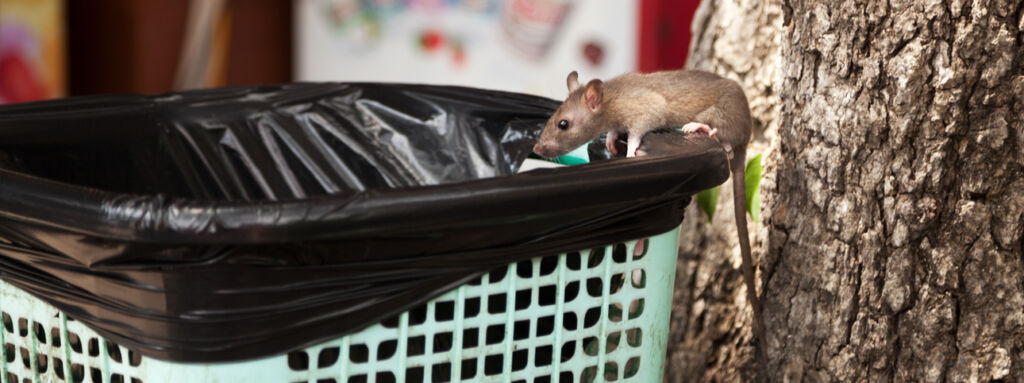July 31, 2020
Cleaner Trash Cans Mean Fewer Pests
Due to the smaller amounts of customers in restaurants during the COVID-19 pandemic, restaurants are relying on carry-out and delivery orders to satisfy customers. Because of the absence of customers, pests like rats and mice in particular, are becoming more brazen and working harder to get into trash receptacles to feed their hunger. To thwart these desperate rodents, discover several ways to pest-proof your trash receptacles.

As we navigate our inability to get out and grab a bite to eat at our favorite restaurant as often as we used to, the foodservice industry has had to adapt to having emptier dining areas. As a result, restaurants have been relying on carry-out and delivery to satisfy customer appetites. But the lack of available food isn’t just an inconvenience for people.
Due to the absence of patrons, pests – rodents like rats and mice in particular – are becoming more brazen and working harder to get into trash receptacles. The lack of trash has meant a shrinking menu for rodents. And they’re as hungry as ever.
In fact, the Centers for Disease and Control has warned that rats are exhibiting “unusual and aggressive behavior” and that preventive measures against rodent infestations are crucial during this time.
To thwart these desperate rodents, there are several ways you can pest-proof your trash receptacles and cut off what remains of their main source of food.
Put on a lid on it
Leaving food waste in trash receptacles for too long is a mistake – especially in a time when pests are in full survival mode. If not kept on a strict disposal schedule, your containers can become overfilled and susceptible to vermin invasion. An efficient way to keep containers from being overfilled is to have a tight-sealing and securable lid.
With the addition of a securable lid, pests have a hard time getting into trash cans that are waiting for disposal. When food is exposed, the aroma of it is almost asking for vermin to gather. Be sure to keep a proper lid on your trash so you aren’t having to constantly clean up overturned receptacles.
What the experts say
As we continue towards the reopening phase for restaurants, Urban Rodentologist Dr. Robert Corrigan thinks this is the perfect time to pest-proof your trash receptacles.
“We should capitalize on this time to clean up as best as we can,” said Corrigan. “And, hopefully, the lesson we learned in part from this pandemic is we need to be cleaner.”
Clean regularly
While small animals can catch the scent of food in trash receptacles, the residual remnants of food can attract other pests. Wasps and bees are known to hover around trash bins even when they’re empty due to any muck or sludge leftover from their last disposal.
It’s good practice to rinse containers out once per week with soap and water to eliminate any leftover food or beverage spills that may have stuck to the sides of the container. If they are left dirty, over time, insects may be prone to stay in the vicinity of trash areas even after disposal.
Commercial Zone offers a full line of waste containers with removable liners – both galvanized steel and molded plastic – that make regular maintenance quick and easy. Waste containers in the industry-leading PolyTec™ series each feature snap-lid closures to keep lids in place and the patented GrabBag™ system to secure trash bags for hassle-free maintenance.
Set up stable barriers
Businesses can benefit from installing ready-made enclosures or building their own to keep trash receptacles from being bombarded with starving rodents. Placing canisters in a small shed or an open-top pen and adding padlocks helps prevent anything from getting in and wreaking havoc on the containers.
You can also use enclosures that fit each receptacle rather than taking up an entire area. Enclosed structures are easy to maintain and provide a cleaner look to your trash disposal area. Either way, safeguarding your trash inside a protective barrier is an excellent pest repellent.
